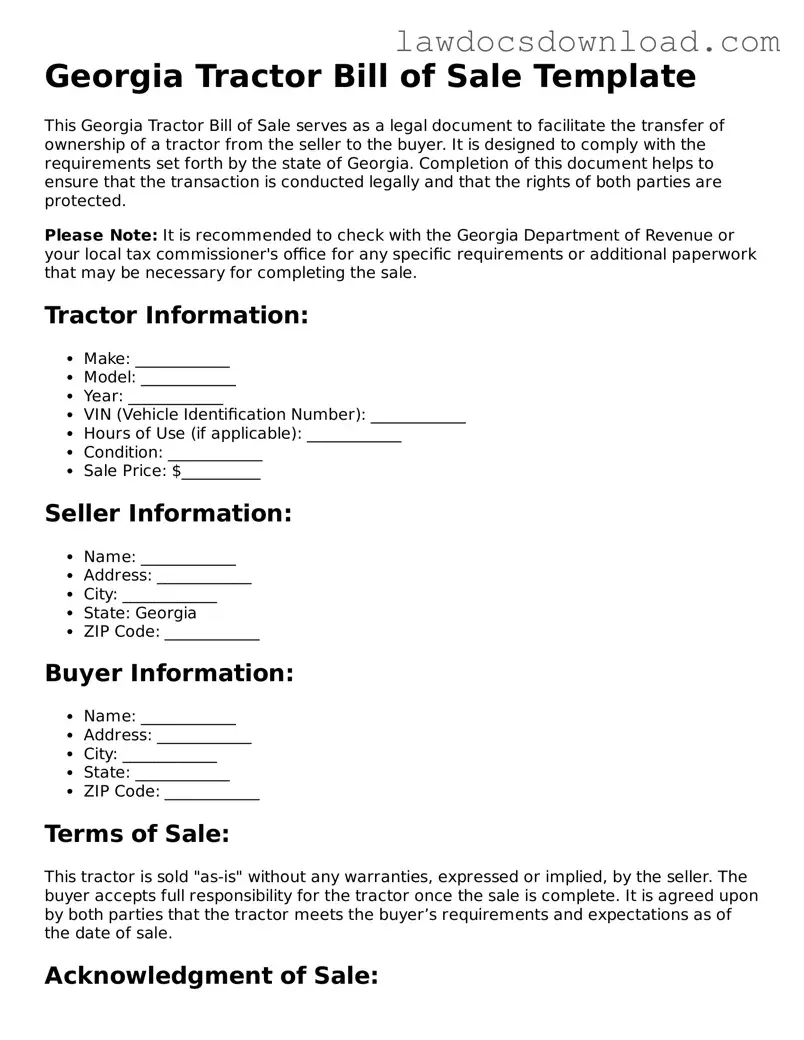The Georgia Tractor Bill of Sale form shares similarities with a Vehicle Bill of Sale, commonly used when buying or selling cars, trucks, motorcycles, and other road vehicles. Both documents serve as vital records, confirming the transfer of ownership from the seller to the buyer. They typically include essential information such as the make, model, year, and identification numbers of the vehicle or tractor, the sale price, and the date of the sale. Furthermore, they provide legal protection and proof of the transaction for both parties involved.
Another document similar to the Georgia Tractor Bill of Sale is the Equipment Bill of Sale. This form is often utilized in the sale of machinery and heavy equipment other than tractors, such as construction or agricultural equipment. Like the Georgia Tractor Bill of Sale, it outlines the details of the sale, including a description of the equipment, the sale price, and the parties' information. It acts as a receipt of the transaction, ensuring that the item's ownership is legally transferred to the buyer.
The Boat Bill of Sale is also akin to the Georgia Tractor Bill of Sale, tailored for transactions involving watercraft. It includes details specific to boats, such as the hull identification number, length, make, and year, in addition to the standard information found on a bill of sale. This document is essential for proving ownership, and depending on the state, it may be required for the registration of the boat under the new owner's name. The emphasis on specific identification features of the boat parallels the tractor bill of sale's focus on machinery details.
Comparable to the Georgia Tractor Bill of Sale, the Firearm Bill of Sale is used when privately selling or purchasing a gun. This document includes detailed information about the firearm being sold, such as the make, model, caliber, and serial number, along with the parties' personal information and the sale terms. It ensures that the sale complies with state regulations and provides a record that can be used for background checks and registration purposes, similar to how the tractor bill of sale formalizes the transfer of ownership.
The Pet Bill of Sale is another document that bears resemblance to the Georgia Tractor Bill of Sale, designed specifically for transactions involving animals like dogs, cats, and horses. It contains descriptions of the animal being sold, such as breed, age, health information, and any special terms of the sale. This form is crucial for documenting the change in ownership and the agreed-upon conditions, ensuring both the buyer's and seller's understanding and agreement, much like the tractor bill of sale does for equipment transactions.
Lastly, the Business Bill of Sale is similar to the Georgia Tractor Bill of Sale in that it documents the transfer of ownership of business assets or an entire business from one party to another. It includes specifics about the assets being sold, including their description, the business name, and the details of the transaction. This document is fundamental in establishing the legal transfer of business property, providing a legal receipt for the transaction in a manner similar to how the tractor bill of sale finalizes the sale of a piece of agricultural equipment.

